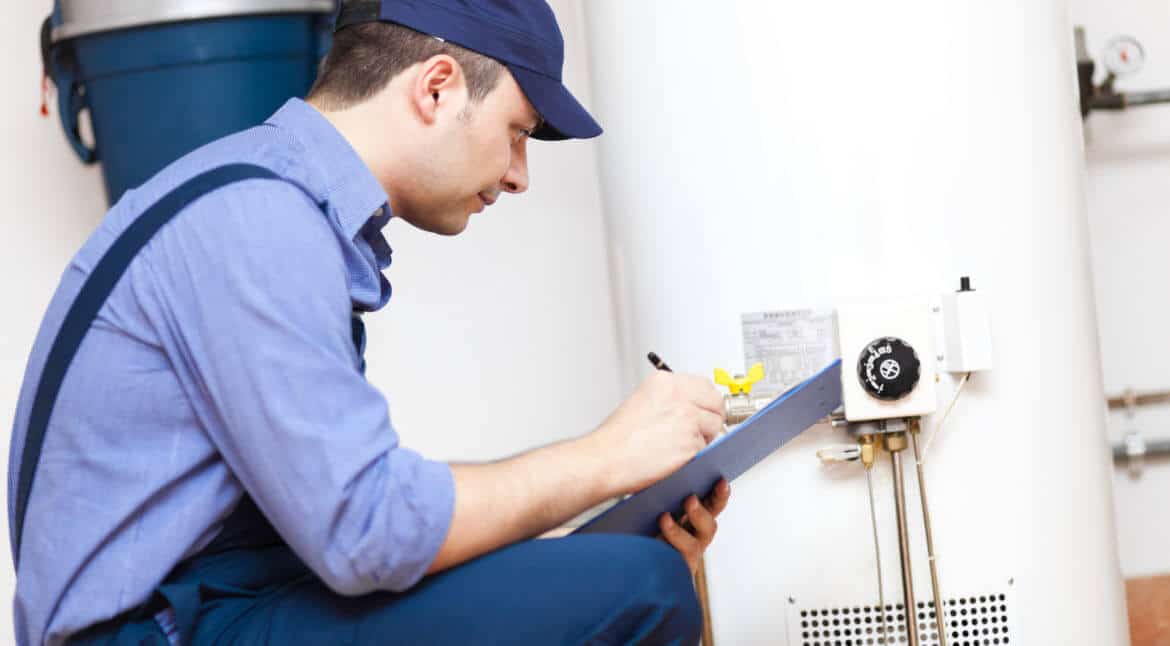
So, how can you catch water heater repair or replacement signs?
Your water isn’t as hot as it used to be
The easiest problem to notice is that the water from the showers and faucets isn’t hot! If you’ve noticed that your showers aren’t as steamy as they used to be, it could be a sign that your water heater is on the fritz. Over time, sediment can build up at the bottom of your tank and insulate the heating elements from the water, making them far less effective. In many cases, these issues occur in water heaters that have been in use for years. Flushing your tank (a process where sediments are removed) can often improve the situation, but if the problem persists, it may be time for a new gas or tankless hot water heater.
Hot water doesn’t last long
Water heaters are made to store many gallons of hot water that is readily available for use. However, when your hot water supply doesn’t last very long, there is likely an issue with your water heater. There can be many reasons this is happening, but a common problem many homeowners face is the heating element. When the element becomes faulty, some of the water within the water heater cannot be heated as quickly and runs out before you are finished showering, and nobody wants an ice-cold shower or fluctuating water temperatures.
Inconsistent water temperature
Have you noticed your water temperature changing even though you haven’t changed it? If the water temperature fluctuates between cold, hot, and lukewarm, there is probably a problem with the water heater. Inconsistent temperatures are most commonly caused by mineral deposits building up inside or a heating element malfunctioning. However, if it’s an old water heater, it might be better to replace it. Whatever the reason is, Canyon Hills Plumbing can help you identify the problem and remedy it fast!
Reduced or low water pressure
There can be many reasons you are experiencing low water pressure, but in some cases, it might be because of your water heater. In addition to problems with temperature, minerals can often accumulate on heating elements or block water pipes, reducing the water pressure. Water pressure can also get weaker as a water heater gets older.
Your water heater leaks
Water leaks can be incredibly damaging to your home, especially if it is a leak in your water heater, as they have a constant supply of water, with tanks holding a large amount of hot water. If there’s water pooling at the bottom of your water heater, you need to address this ASAP. There are many potential causes of a water heater leaking. Sometimes it can be a faulty hot or cold water connection, damaged drain valve, loose gaskets, or even corrosion inside the tank; we can usually remedy these situations with a simple repair, but if it’s leaking out of the water tank, a repair is not going to fix your problem. If the leak is left unchecked, it can get worse, and you will need to repair any water damage it has caused and have a local plumber replace your water heater.
Weird sounds and noise coming from the water heater
As gas water heaters work hard over the years, they naturally age and start making a soft buzzing sound, which isn’t alarming. However, If you’ve started hearing popping, cracking, or banging noises coming from your water heater, there’s a good chance that sediments have built up on the bottom of your tank and are now burning when they come into contact with the heating elements. While this might not seem like a big deal at first, if left unchecked, this problem will only get worse until sediments completely block off access to the heating element – at which point you’ll need to either replace your anode rod (could void the appliance’s warranty if you do this yourself) or get a new water heater entirely. Flushing your tank should take care of this problem temporarily, but if sediments continue to build up at an accelerated rate, a replacement will eventually become necessary.
Rusty water or signs of corrosion
Rust in your hot water is usually a sign of bacteria growth, pipe corrosion, water heater corrosion, or mineral deposits in the water supply. This rusty water appearance may also be a sign that your anode rod (a metal rod that protects the inside of your tank from corrosion) has failed and needs to be replaced. Anode rods should be checked and replaced every 3-5 years, depending on the hardness of your water (the higher the hardness, the more often they’ll need to be replaced). If you don’t replace your anode rod in a timely manner, the corrosive nature of the hard water will eat through the walls of your water heater, causing leaks and necessitating repair or replacement.
You can also tell if your water heater has corroded if there is rust or corrosion on the outside of the water heater. However, there could be an issue with the pipes corroding instead. Our experts at Canyon Hills Plumbing can help you identify the issue and take the necessary steps to repair it.
Unpleasant smelling cloudy water
Is the water from your taps cloudy and has a strange odor? When this happens, you should contact a local professional plumber as soon as possible to remedy the issue, as the water could become harmful for use.
Tank won’t drain through the drain valve
When this happens, it may be time for a hot water heater repair.
Your energy bills have increased unexpectedly
Suppose you’ve noticed that your energy bills gradually increased over time without explanation. Still, if the problem persists, it may be time for a new water heater.
Are You Experiencing Issues with Your Water Heater?
5 Risks of an Older Hot Water Heater
Here are some other risks of not paying attention to your older hot water heater.
1. Mold Growth from Leaks
If your water heater is leaking then it is also at risk for mold growth. This is because water and moisture are the two key ingredients that mold needs to grow. Not only does mold pose a serious health risk, but it can also cause structural issues in your home.
2. Nesting Critters
Another risk of an older water heater is that it could become a home for critters looking to nest. Small animals like the warmth of a water heater and will often nest near a water heater.
Rats and mice can cause all sorts of damage, including chewing on wires and insulation. This not only damages your water heater but also creates a fire hazard. To prevent this from happening, make sure to keep the area around your water heater clear and free of debris. If you notice damage from chewing and nesting then it’s time to start shopping for a new water heater.
3. Electrical Shortages and Outages
As an electrical water heater ages, you may start to notice more power outages and shortages. This is because the heating element in an electric water heater can short-circuit as it ages. If this happens, it can trip the breaker or blow a fuse.
4. Blocked Valves
Older water heaters might have trouble maintaining water pressure because the valves are starting to fail. Over time, sediment and minerals can build up in the valves, causing them to become blocked. This can lead to a loss of water pressure or even a complete loss of hot water.
5. Overheating
One of the signs that your water heater is going bad is if it starts to overheat. This can lead to serious problems, as skin burns from too hot of water and even fires.









